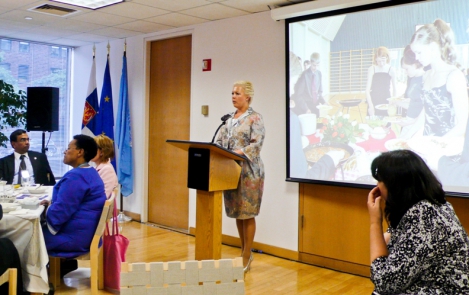-
Reset
+


Evelin Ilves: good school lunches will help reduce possible future health risks
21.09.2011
Yesterday in New York, Evelin Ilves participated at a healthy school lunch conference, which discussed catering for students in Estonian schools, at the invitation of the Finnish UN representation and the Finnish Ministry of Health Care and Social Affairs.
In her presentation, which was prepared in co-operation with the National Institute for Health Development, Evelin Ilves said that school lunches have been free for students in elementary schools since 2002 and in basic schools since 2006, and she explained that most local authorities – from Kolga-Jaani to Tallinn – are allocating extra school funds to finance the catering of students.
“In Estonia, the free school lunch for children and their parents must cover one third of a student’s daily energy and nutritional requirements – this is one of the highest figures in Europe,” Evelin Ilves said. “At the same time, it is important to focus on variety and the use of unprocessed foodstuffs, when preparing the school lunch menus.”
According to Evelin Ilves, the school lunch, which is both liked by students and meets their requirements, will contribute to a smaller number of purchases made from snack bars, while helping to increase children’s consumption of fruits and vegetables. This will also help to reduce obesity problems in school children.
"The health of an adult is directly related to our childhood habits. Obesity in children and adults and too little movement have contributed to a drastic increase in the incurrence of so-called lifestyle diseases – diabetes, cardiovascular diseases and cancer – throughout the world, resulting in more than 36 million deaths every year, 80% in developed countries. Therefore, a decent school lunch will also have a long-term effect and ensure good health,” Evelin Ilves said at the conference, which took place in New York. She also made reference to the current UN General Assembly at which the problems of lifestyle or non-communicable diseases (NCD) related to the global health crisis are being discussed for the second time* in the history of the global organisation.
“During the recession, the main problem encountered by Estonian families was linked to purchasing sufficient and diversified food; for this reason, the school lunch represents one of the most important daily meals for children,” Evelin Ilves emphasised.
The Finnish Minister of Health Care and Social Affairs, Maria Guzenina-Richardson, and experts from the United States of America, India and World Health Organisation (WHO) also spoke at the conference.
Evelin Ilves will stay in New York in relation to the United Nations 66th General Assembly, as the Estonian Head of State, Toomas Hendrik Ilves, is taking part in the assembly.
* The first discussion at the UN General Assembly concerning a global health crisis took place in 2001 and focused on the prevention of the spread of HIV.
Office of the President
Public Relations Department
Phone 631 6229




